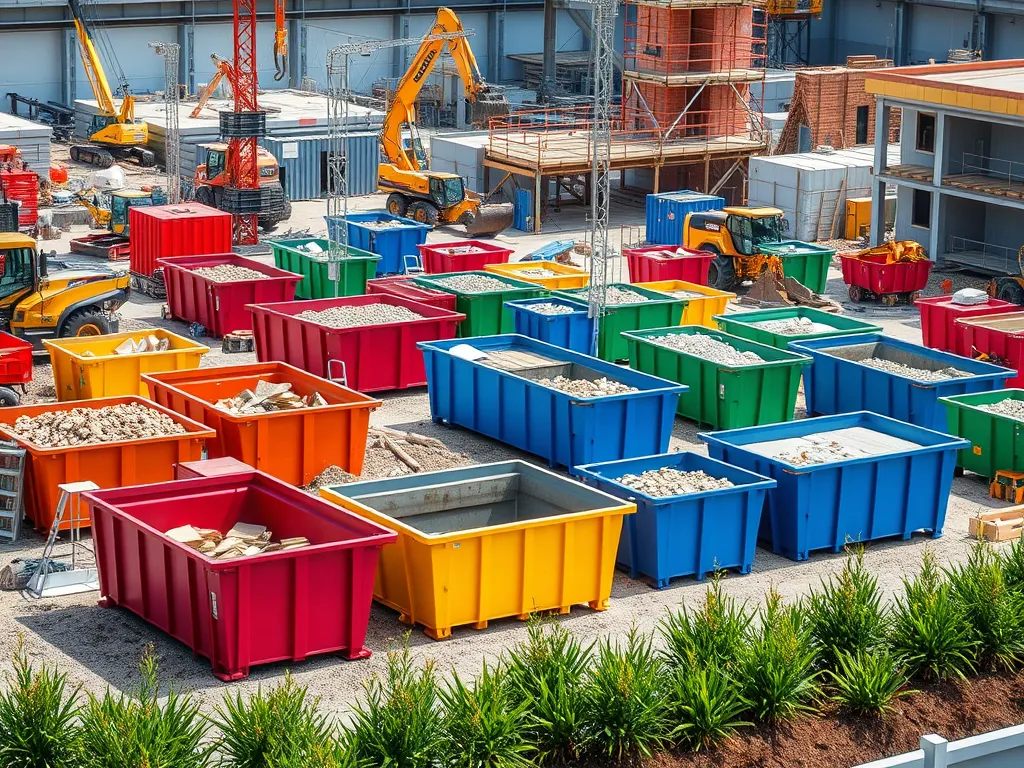Maximize Efficiency with Roll-off Dumpsters in Projects

Understanding Roll-off Dumpsters: A Comprehensive Guide
Roll-off dumpsters play a crucial role in waste management, particularly for large-scale cleanout and renovation projects. These containers are designed to be transported with ease, making them an excellent solution for any business or homeowner looking to efficiently dispose of waste material. Roll-off dumpsters come in various sizes and types to fit different waste management needs.
For efficient waste disposal on construction sites, consider utilizing a roll-off dumpster, which you can explore further at https://en.wikipedia.org/wiki/Roll-off_(dumpster).
Typically, roll-off dumpsters are constructed from durable materials to withstand heavy loads. They can be rented for either short-term or long-term use, making them versatile for residential, commercial, and industrial projects. Understanding the unique features of roll-off dumpsters is essential for utilizing them effectively and responsibly in waste disposal.
One of the key advantages of roll-off dumpsters is their accessibility. They can be placed in various locations, ensuring that waste collection is convenient for users. Additionally, the design of roll-off dumpsters allows for safe loading and unloading, which minimizes the risk of injury. Overall, roll-off dumpsters are an indispensable tool for managing waste efficiently.
As waste management becomes increasingly important for environmental sustainability, the demand for roll-off dumpsters continues to grow. These containers not only facilitate the removal of unwanted materials but also promote proper waste disposal practices by ensuring that debris is collected and transported to appropriate waste management facilities.
Choosing the right roll-off dumpster can significantly impact the effectiveness of your waste removal strategy. Whether it’s for a home renovation, construction site, or large cleanup project, understanding the options available can help you make an informed decision on which type and size of roll-off dumpster to rent.
Types of Roll-off Dumpsters
Residential roll-off dumpsters are typically smaller in size, ranging from 10 to 20 yards, making them ideal for home cleanouts and remodeling projects. They cater to homeowners who need to dispose of unwanted items, yard waste, or construction debris without the hassle of multiple trips to the landfill.
Commercial roll-off dumpsters are larger, often ranging from 20 to 40 yards, and are suitable for businesses undertaking significant renovations or overseeing large-scale cleanouts. These dumpsters can accommodate a larger volume of waste and are perfect for retail locations, office buildings, and other commercial spaces.
Construction roll-off dumpsters are designed specifically for construction sites. They are built to handle heavy debris like concrete, wood, and metal and come in various sizes, often between 20 to 40 yards. Construction sites require durable and robust roll-off dumpsters to handle the unique waste generated during building projects.
Specialty roll-off dumpsters are available for unique waste types, such as hazardous materials, electronic waste, or bulky items like furniture and appliances. These dumpsters are designed to comply with specific regulations and safely contain materials that require special handling.
Benefits of Roll-off Dumpsters
One of the primary benefits of using roll-off dumpsters is their cost-efficiency in waste removal. Compared to taking multiple trips to a landfill, renting a roll-off dumpster can save individuals and businesses both time and money, providing a flat rate that suits budgetary needs.
Time-saving is another significant advantage of using roll-off dumpsters. With a roll-off dumpster placed on-site, users can remove waste as it accumulates throughout a project, preventing clutter and potential safety hazards. This ensures that projects can proceed smoothly without interruptions for waste disposal.
Roll-off dumpsters also contribute to environmental benefits by promoting proper waste disposal. By utilizing these containers, users can ensure that waste is transported to designated facilities, reducing illegal dumping and encouraging recycling practices.
Convenience is key when undertaking large cleanouts, and roll-off dumpsters provide just that. Their placement on-site means that waste can be easily discarded, making the entire cleanout process more efficient and less overwhelming for individuals and businesses alike.
How to Choose a Roll-off Dumpster
When choosing a roll-off dumpster, one of the first factors to consider is the size. Assess the volume and type of waste you expect to generate, as dumpsters come in various sizes ranging from 10 to 40 yards. Understanding your needs will help you select the appropriate container.
Understanding weight limits is crucial, as roll-off dumpsters have specific weight restrictions depending on their size and type. It’s important to be aware of these limits to avoid any additional fees or penalties that may arise from overloading a dumpster.
Comparing rental prices and services is also essential when selecting a roll-off dumpster. Different rental companies may offer varying prices based on size, service inclusions, and delivery fees. Ensuring you get the best value for your budget is important for effective waste management.
Identifying appropriate uses for different types of roll-off dumpsters will help optimize your waste disposal strategy. Each dumpster is designed for specific materials, so knowing which type to use based on your project can streamline the disposal process.
Roll-off Dumpster Rental Process
The process to rent a roll-off dumpster usually involves several simple steps. Begin by determining the size and type of dumpster you need, then contact a local rental company. Provide them with details about your project and request a quote.
When it comes to delivery and pickup, you can expect the dumpster to be placed in a convenient location on your property. Rental companies typically schedule a specific time for delivery and will coordinate pickup once you’ve completed your project or the dumpster is full.
A clear pricing breakdown of rental fees is provided by reputable companies. This transparency ensures that there will be no surprises, and you'll understand the total cost, including any potential extra fees for exceeding weight limits or extended rental periods.
For effective use during projects, it’s advisable to plan ahead. Use the dumpster strategically by avoiding overloading and sorting waste materials to facilitate recycling and disposal. Keeping the dumpster organized can improve efficiency and productivity during cleanouts.
Best Practices for Using Roll-off Dumpsters
Loading a roll-off dumpster safely is essential. It involves distributing weight evenly to avoid tipping and ensuring that waste does not extend beyond the sides of the container. This practice ensures safe transport and compliance with rental guidelines.
Avoiding common mistakes in the process can save you time and money. Some mistakes to watch out for include failing to check weight limits, loading prohibited materials, or overloading the dumpster, which can result in additional fees.
Proper sorting of waste for recycling is a best practice when using roll-off dumpsters. Separating recyclables from general waste before disposal can promote sustainable waste management and reduce landfill contributions.
Maintenance tips for rental dumpsters include keeping the area clean around the dumpster and reporting any damages immediately. Taking these steps helps in ensuring a smooth rental experience and maintaining the integrity of the container.
Waste Management and Roll-off Dumpsters
Roll-off dumpsters play a significant role in waste management by providing an efficient means for individuals and businesses to dispose of large quantities of waste. Their ability to accommodate unique waste types allows for proper disposal methods to be utilized effectively.
The impact on local landfills and recycling centers cannot be overstated. Roll-off dumpsters ensure that waste is transported away from sites efficiently, thereby reducing landfill overcrowding and promoting recycling by directing appropriate materials to recycling facilities.
Regulations surrounding waste disposal vary by region. Understanding local laws governing waste management and disposal practices is crucial when using roll-off dumpsters to ensure compliance and avoid potential fines.
Adopting best practices in sustainable waste management is essential for promoting environmental protection. By choosing to use roll-off dumpsters responsibly, individuals and businesses can contribute to effective waste management systems that support recycling and minimize landfill dependency.
